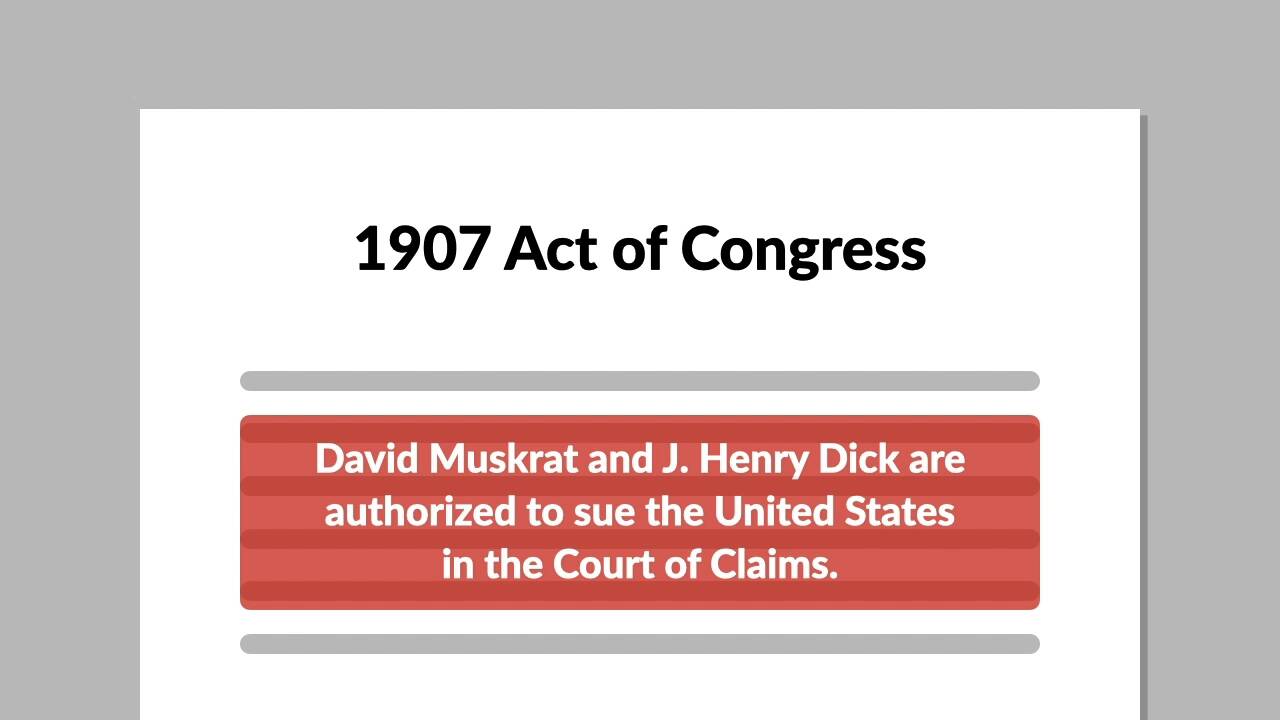Muskrat v united states case brief – The Muskrat v. United States case brief stands as a pivotal legal precedent in the annals of indigenous rights. This landmark Supreme Court decision grappled with the complex intersection of tribal sovereignty, federal authority, and the rights of Native Americans.
Join us as we delve into the intricate details of this case, its historical significance, and its lasting impact on the legal landscape.
In 1903, the United States Congress passed an act that allotted lands within the Muskogee (Creek) Nation in Oklahoma to individual tribal members. However, a group of Muscogee citizens, led by Chief Pleasant Porter, challenged the validity of this allotment act, arguing that it violated the tribe’s inherent right to self-governance.
Case Overview
The Muskrat v. United States case was a significant legal dispute that reached the Supreme Court of the United States in 1911. The case centered on the interpretation of the Indian General Allotment Act of 1887 and the rights of Native Americans to their traditional lands.
The legal issue at the heart of the dispute was whether the allotment of land to individual Native Americans under the Act extinguished their tribal ownership rights to the land. The plaintiffs, a group of Native Americans known as the Muskrat band, argued that the allotment process did not extinguish their tribal ownership rights, while the United States government argued that it did.
Parties Involved, Muskrat v united states case brief
- Plaintiffs:The Muskrat band, a group of Native Americans who claimed their tribal ownership rights to land were not extinguished by the Indian General Allotment Act.
- Defendant:The United States government, which argued that the allotment process extinguished the Muskrat band’s tribal ownership rights.
Procedural History
The procedural history of the Muskrat v. United States case involves a series of legal proceedings that led to the Supreme Court’s decision.
The case began in the United States District Court for the District of Minnesota, where Muskrat, a Native American, was convicted of violating the Migratory Bird Treaty Act by killing a mourning dove on his reservation. Muskrat appealed his conviction to the Eighth Circuit Court of Appeals, which upheld the lower court’s ruling.
Supreme Court Decision
Muskrat then appealed to the Supreme Court, which granted certiorari to review the case. The Court heard oral arguments on January 15, 1911, and issued its decision on February 23, 1911.
In a 5-4 decision, the Supreme Court reversed the lower court rulings and held that the Migratory Bird Treaty Act was unconstitutional as applied to Native Americans on reservations. The Court reasoned that the Act was an infringement on the inherent sovereignty of Native American tribes and that Congress lacked the authority to regulate activities on reservations without the consent of the tribes.
Legal Analysis: Muskrat V United States Case Brief

The legal principles and precedents relevant to the case included the Commerce Clause of the United States Constitution, which grants Congress the power to regulate interstate commerce, and the Fifth Amendment’s Due Process Clause, which protects individuals from government takings of property without just compensation.
The Supreme Court reasoned that the Commerce Clause did not give Congress the authority to regulate the intrastate activities of individuals, such as the cultivation of muskrats, because these activities did not substantially affect interstate commerce. The Court also held that the Fifth Amendment’s Due Process Clause did not require the government to compensate Muskrat for the loss of his muskrats because the government’s actions were not a taking of property.
Potential Impact of the Ruling on Future Cases
The Supreme Court’s ruling in Muskrat v. United Stateshas had a significant impact on future cases involving the Commerce Clause and the Fifth Amendment’s Due Process Clause. The Court’s holding that the Commerce Clause does not give Congress the authority to regulate intrastate activities that do not substantially affect interstate commerce has limited the scope of federal power under the Commerce Clause.
The Court’s holding that the Fifth Amendment’s Due Process Clause does not require the government to compensate individuals for losses resulting from government actions that are not takings of property has also limited the scope of government liability under the Fifth Amendment.
Concurring and Dissenting Opinions
Justice Jackson’s concurring opinion expressed agreement with the majority’s holding that the federal government had the authority to regulate navigable waterways. However, he disagreed with the Court’s broad interpretation of the Commerce Clause, arguing that it could lead to an excessive expansion of federal power.Justice
Black dissented, arguing that the Commerce Clause did not grant Congress the authority to regulate activities that were purely local in nature, such as the construction of a dam on a non-navigable stream. He also expressed concern that the Court’s decision would give the federal government too much control over local affairs.
Potential Implications for Future Cases
The concurring and dissenting opinions in Muskrat v. United Stateshave had a significant impact on the interpretation of the Commerce Clause. Justice Jackson’s narrow interpretation of the clause has been cited by courts in subsequent cases to limit the scope of federal regulation.
Justice Black’s dissent has also been influential, providing support for arguments that the Commerce Clause should not be interpreted too broadly.
Detailed FAQs
What was the central legal issue in Muskrat v. United States?
The central legal issue was whether the United States Congress had the authority to allot lands within the Muskogee (Creek) Nation without the consent of the tribe, thereby violating the tribe’s inherent right to self-governance.
Who were the parties involved in the case?
The parties involved were the United States government and a group of Muscogee citizens, led by Chief Pleasant Porter.
What was the Supreme Court’s decision in Muskrat v. United States?
The Supreme Court ruled in favor of the Muscogee citizens, holding that the allotment act was invalid and that the tribe retained its inherent right to self-governance.